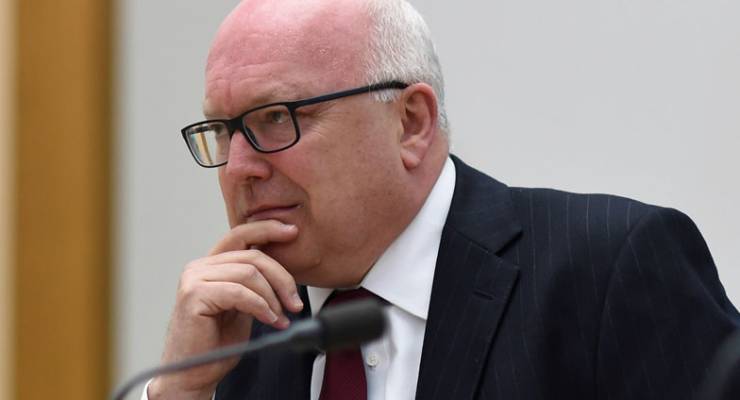
Amid government attempts to run interference and smear the Solicitor-General on Friday, Justin Gleeson provided more compelling evidence that Attorney-General George Brandis had misled Parliament — and Brandis talked himself into an even deeper hole.
One of the issues that has received little attention during the saga of Brandis’ (unlawful) direction that no one access the Solicitor-General for advice without his approval is that Brandis would not have drafted the direction himself — it would have been drafted by the Office of Parliamentary Counsel based on instructions from the Attorney-General’s Department (indeed, OPC made a submission about the direction to the inquiry, being conducted by the Senate Standing Committees on Legal and Constitutional Affairs). This was done, as we know from AGD’s own submission to the inquiry, on April 27-28 after Brandis asked for the direction on April 20. So Brandis, his office, numerous officers with AGD and OPC staff all knew a direction was being drafted — but no one mentioned it to the Solicitor-General, the object of the direction, who was required to be consulted. To use a favoured phrase of Julia Gillard’s, that’s passing strange.
[Brandis misled Parliament and mishandled advice, and he’s got to go]
Gleeson teased this out in his evidence to the committee about a conversation with the secretary of AGD, Chris Moraitis, and his deputy secretary, Iain Anderson:
“When I had my conversation with Mr Anderson and Mr Moraitis, I said to them, ‘In the period leading up to 4 May [the date of issuing of the direction], you must have known about this direction. You were helping draft it. The Parliamentary Counsel knew about it. The Attorney knew about it. His staff knew about it. How on earth could it have been that the one person who needed to know was not told?’ That is the question I asked, and the best answer I could get from Mr Anderson and Mr Moraitis was — they certainly did not suggest to me I had been consulted; they said, ‘We think that was something which the Attorney was going to deal with.'”
If that exchange is an accurate portrayal of the conversation, it’s damning — senior AGD officials knew that Gleeson had not been consulted and thought Brandis or his office would do it. There was certainly no response along the lines of “what are you talking about, we consulted you on November 30 last year”. Which prompts another question — whether Brandis or his office told AGD not to consult with Gleeson.
[George Brandis and the struggle for competence]
Brandis, having conceded at the start of last week that Gleeson was entirely correct in his account of the events leading up to the issuing of the direction, is now defending himself on the basis that he had “consulted” with Gleeson on November 30 (when he mentioned the then-existing direction in passing) and that there’s no legal definition of consult, so just because Gleeson didn’t think or know he’d been consulted didn’t mean he hadn’t been.
“The issue underlying this committee’s inquiry boils down to a difference of opinion about the meaning of a word. It concerns the meaning of the word ‘consultation’, referred to in section 17… the words ‘consult’ and ‘consultation’… have no technical legal meaning nor are they defined in the act to which I have been referring, the Legislation Act, and therefore, if a court were considering the question of whether, on a particular set of facts, the word ‘consult’ was appropriate to use to describe them, a court would go to a dictionary as the best lexicographical evidence of the meaning of the word — and that is what I have done.”
But as a number of lawyers immediately pointed out on social media, Brandis — yet again — gets the law wrong. Justice Douglas Drummond of the Federal Court made clear what “consult” means in Bannister Quest Pty Ltd v Australian Fisheries Management Authority in 1997:
“There are many examples where legislation has imposed a duty on administrative agencies and on persons holding particular offices to consult, before acting, with persons and organisations likely to be affected by decisions proposed to be taken by them. Such a duty to consult will ordinarily involve more than the decision-maker telling interested parties what it is going to do; it will usually require the decision-maker to give information to those others and an opportunity to them to respond. The duty will also require the decision-maker to consider the responses and to take them into account, to the extent it considers appropriate, in arriving at the ultimate decision.”
And despite Brandis insisting that consulting means whatever he thinks it means, there is no possible way that he consulted with Gleeson, at least under the meaning used by the Federal Court.
If it wasn’t painfully clear before, it must be now — Brandis misled Parliament.








If Turnbull does not take action and remove this purveyor of untruths it will be another nail in his own coffin !
It’ll make no difference what comes out of the committee, the smarmy barsteward will keep his job simply for the facts that Malcolm hasn’t the balls to remove him and there’s no one else to replace him.
Would that be Chris ‘I lost my notes’ Moraitis?
A nail it is then Colin, Turnbull is too gutless to act against Brandis – he will continue to cower in the corner and hope the stench goes away….
Has there ever been a worse Attorney-General, both in terms of incompetence and political game-playing? He has to go. Why does Turnbull put up with him?